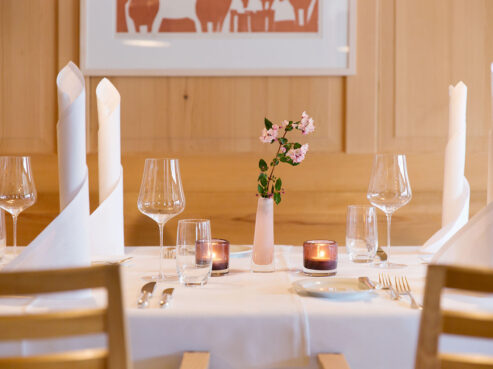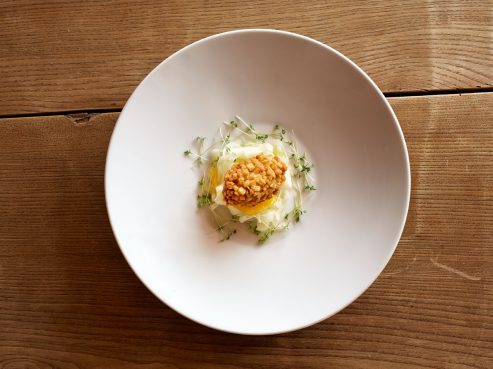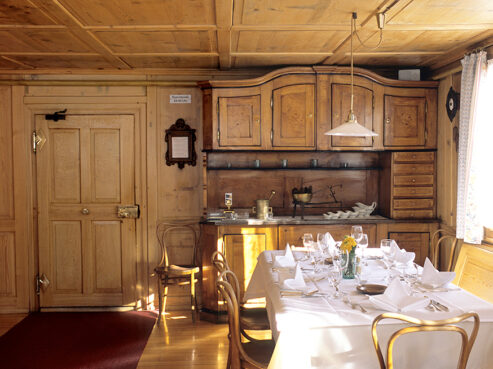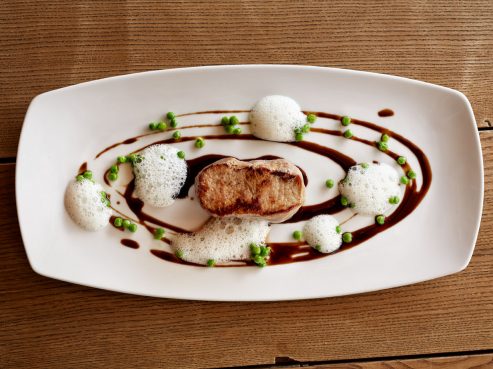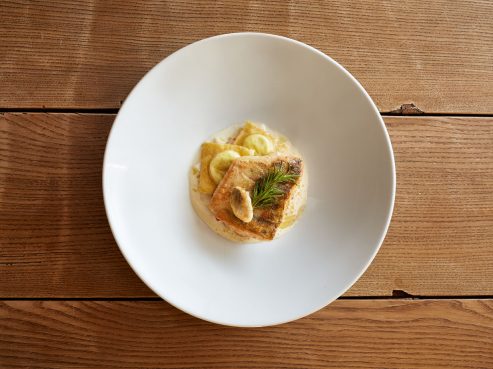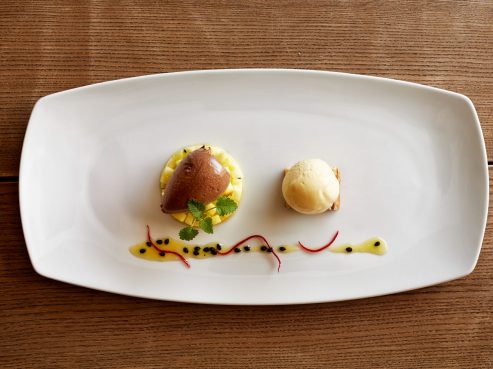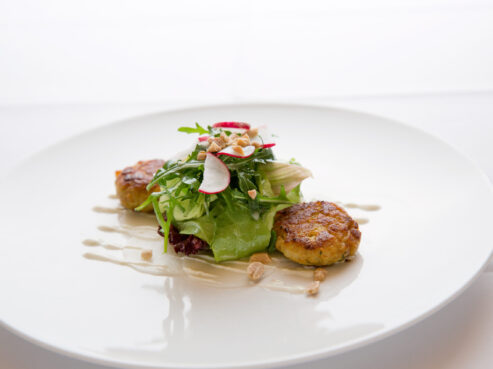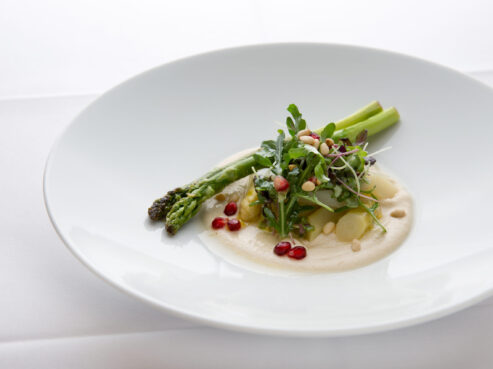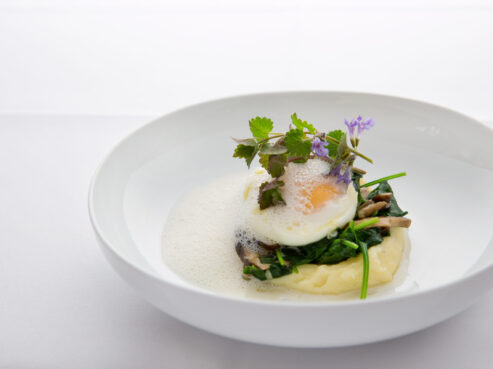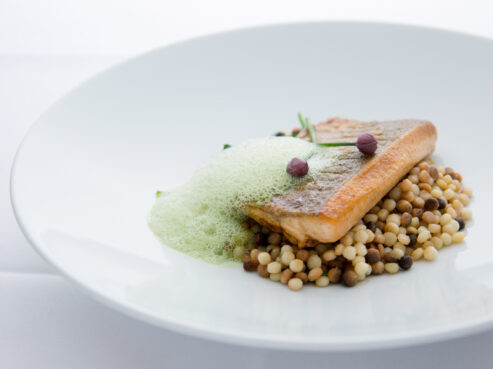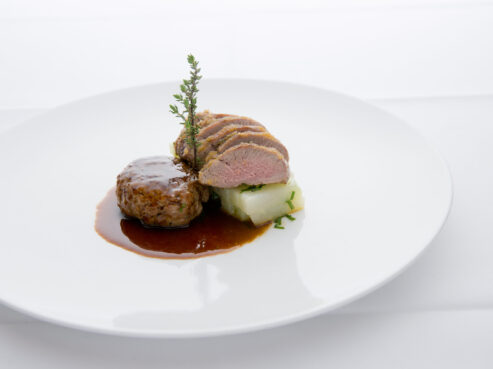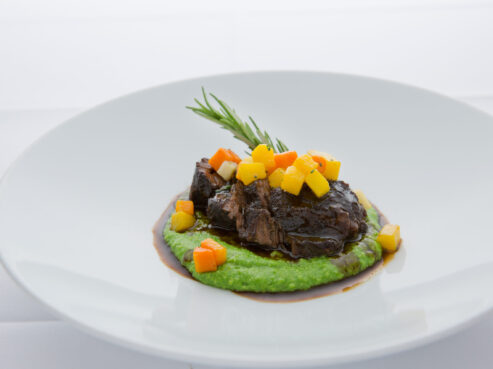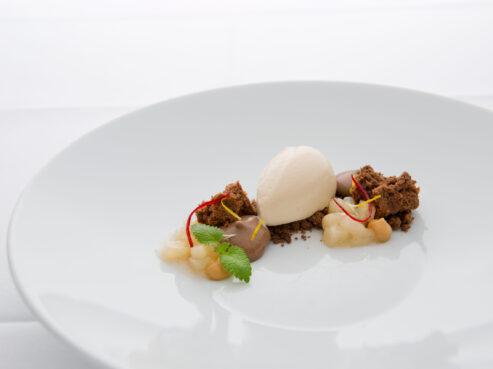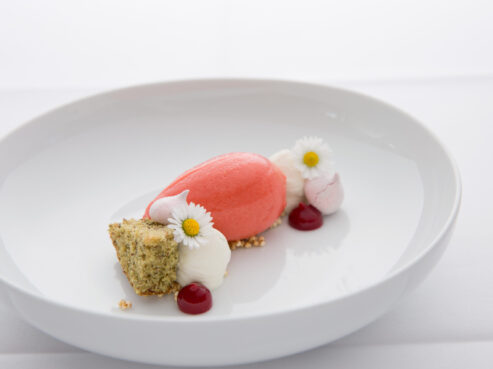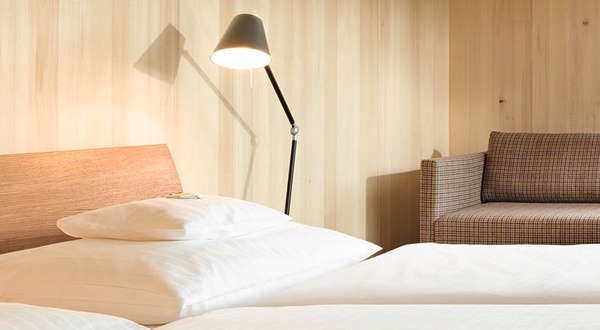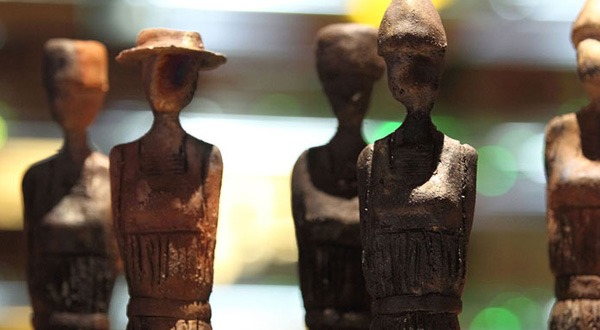Dinner is served. Come on in!
We always find it a little peculiar when we hear talk about the Krone restaurant.
We don’t quite follow when people speak of “the Krone restaurant” in the singular. If the “best room” in someone’s home is for social gatherings, then we can offer quite a choice of best rooms – all of them inviting and comfortable, spotlessly clean, spacious yet not too big, and appealing to the eye with their elegant hand-made furnishings. These are best rooms to meet many different needs: the churchgoers’ regular pre-lunch “Stammtisch” every Sunday, the tired but happy returning skiers and ramblers, the golfers after 18 holes to celebrate or forget …, the formal business dinner, the family celebration, gourmet evenings, afternoon book club sessions.
These pleasant rooms draw their life and sparkle from our guests and also from our service team, every member of which unites professional competence and thoroughness with a personal delight in looking after the comfort of others.
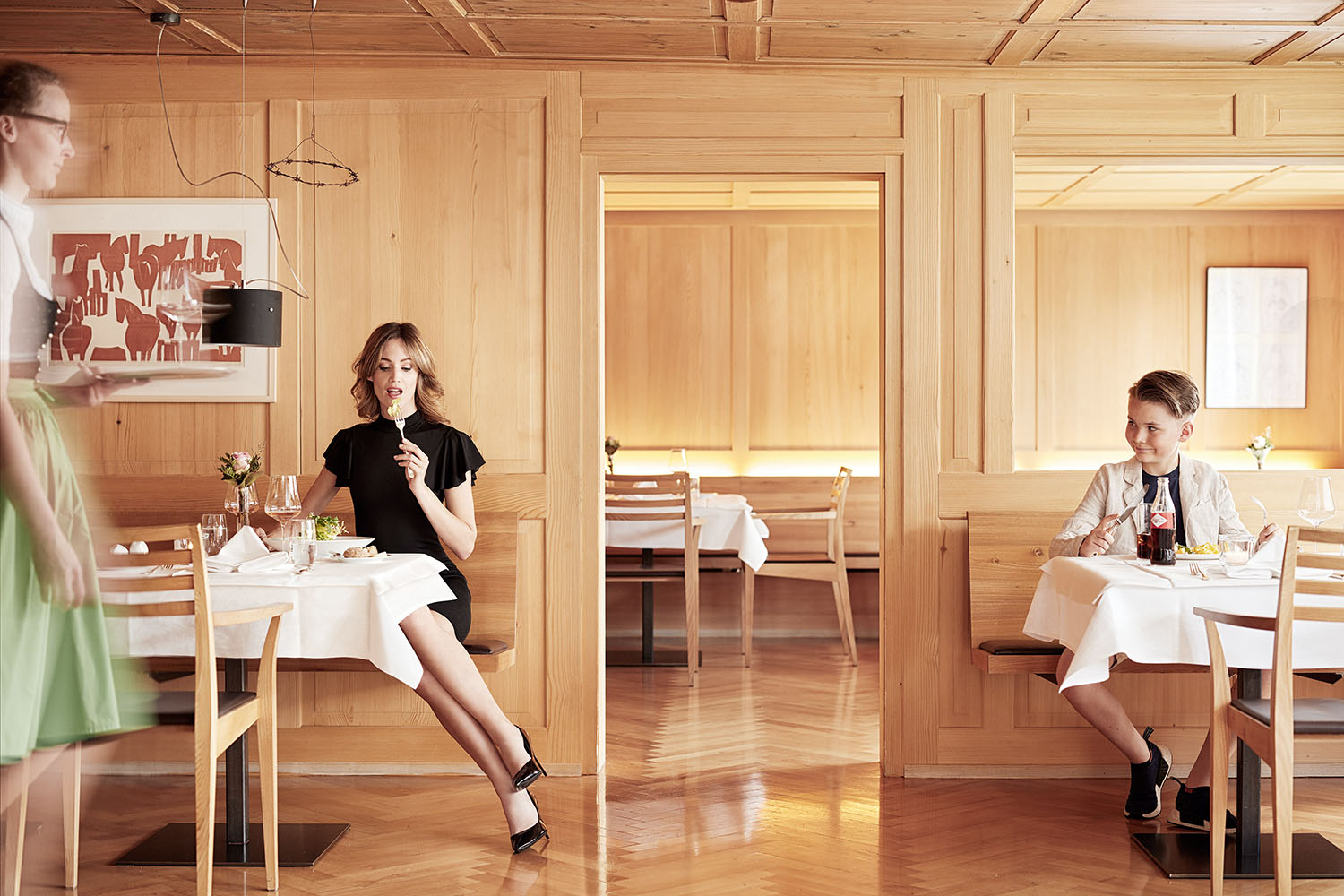
A lot of interesting, enthusiastic and half-thought things are talked about, written, blogged and rated when it comes to dishes and drinks. And I’d be lying if I said we don’t appreciate Honorable Mentions! But the 7 principles of the Kronen kitchen are and remain central for us and how these are transformed into the satisfaction and enthusiasm of our guests.
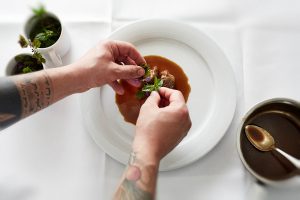
1. A show of dedication
Cooking for us is to host a feast
Anyone who loves food and rustles up a feast will cook what they themselves love to eat. That is one reason why the Krone team sits down to lunch together every day. We take the time to savour our daily specials and sample new culinary concoctions. And if we are whipping up a celebration, we’ll put in plenty of elbow grease. That’s why we do our work with dedication: planning, selecting, cleaning, combining, shaping, marinating, cooking, braising, canning and all the rest.

2. A show of commitment
Less (gimmickry) is more (taste)
Why does the little black dress never go out of fashion? Because it stands on its own, has no need for frills and is beautiful in its simplicity. We don’t sign up to each and every cookery fad. We’ll check them out, choose what we like. And let the others pass us by.

3. Cook with care
Food is precious
To quote Leonardo da Vinci: “Knowing is not enough; we must apply. Being willing is not enough; we must do.” Especially when it comes to meat. At the Krone, we take great care to turn all parts of a beast, including the supposedly not so posh bits, into wonderful dishes such as the legendary Krone ragouts. We’ve always tried to make the most of our produce and waste as little as possible. 20% of all food throughout Europe is thrown away. Some of the reasons behind this awful statistic: we buy too much, we don’t store food properly, we don’t appreciate its value and we don’t use our imagination. Our goal is to reduce food waste at the Krone to well below 10%. You might notice that we serve moderate size side dishes. We’d like our guests to be able to finish their plates, so this is deliberate. However, we also love diners with a hearty appetite so if you’d like a second (or third) helping, just let your server know.

4. know your suppliers
From source to table in under an hour
Our farmers, herbalists, fruit and vegetable growers from the region are more than just suppliers: they are also teachers for us. Their lessons are invaluable and we listen carefully, reflect, ask questions, query old ideas, try new things, implement what we’ve learnt and add our own twist.
We are also a member of the cheese route Bregenzerwald.

5. Use your hands
Hands are tactile. Doing is learning.
In the Bregenzerwald, we have the good fortune to be surrounded by outstanding craftsmanship. Manual dexterity counts for a lot in our kitchen as well. Every day we hone our skills, from planning, selecting, dressing, shaping, marinating, stirring, kneading, slicing, whipping, simmering, braising, stewing, baking, poaching, blanching, preserving and many more hands-on tasks. In this way, we train our instincts every day.

6. Keep it simple
Let the taste do the talking
We don’t drown our food in complicated heavy sauces. We like dishes with few ingredients that complement each other. Ever tried organic carrots with a dash of sherry?
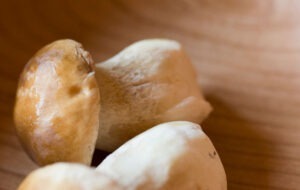
7. Go with the seasons
There is great pleasure in anticipation
That’s why we don’t serve strawberries in the deep of winter or sauerkraut on hot summer days. Throughout the year, you’ll hear us chat about all sorts of tasty treats about to come into season: “If the weather holds for another couple of days, we’ll gather porcini mushrooms”, “Those cherries from our local fruit farmer should be just about ripe”, “I found the first blueberries today!” We don’t have to venture far to be gifted with nature’s offerings. Tender fir tips, meadowsweet and mushrooms can be found on forest walks nearby, while anything from beetroot, currant leaves and nasturtium seeds to fruit, salad, vegetables and flowers thrives in the kitchen gardens of senior manager Wilma, granny Lina and our daughter’s godmother Brigitte. We may be foraging in a fairly small area but we are very happy with our modest ecological footprint.
Michael Garcia Lopez
Culinary musings of Michael Garcia-Lopez, head-chef at the Krone…
Why do you cook?
Because it’s all I ever learnt (laughs). I enjoyed cooking from a very young age. My mum’s from the Bregenzerwald and teaches cooking, my dad’s Spanish – which might explain my basic belief that eating should be more than just putting food in your mouth. In my role as a chef I can influence people: sharing food promotes socialising and closeness. For me, this is a wonderful calling!
What do you like best in your daily work?
Anything that takes a long time, like braising cheeks or sauces – I love watching it develop.
And I have learnt to really appreciate processing every part of an animal. If, for example, a farmer from the region offers lamb at Easter, we take the animal as a whole so that we can really use everything: the so-called noble parts for pink roasting, the legs for roasting, the belly for braising, the rest we use for lamb meatballs and the rest for jus – i.e. sauce. We also process offal and why ever not? One of our suppliers from Schwarzenberg said that most hotels will only accept premium cuts – we thought that just wasn’t right.
In all of my career the Krone is the first place to process all of an animal. It is important to maintain good relationships with our local farmers and meat producers. If we don’t work together, good quality affordable supply from the region will dry up. Surely, 100% value creation for our region sounds like a decent plan!
Name your three favourite tools…
My peeling knife, my mortar and of course my hands. The mortar is ideal for spices, herbs and seeds that I need for marinades and pickles. I use the tourniquet for a lot of things, for example, for cleaning vegetables, which is an almost meditative work, but also for peeling ginger, garlic and the like.
My hands I need for simply everything, they are sensitive testing and measuring instruments, they help me shape the perfect ravioli and much more. I have to add, though, that you’ll find me with a knife in my hands most of the time…
What do you enjoy about cooking?
It simply makes me happy when we can send a good meal to the guest: Meat on the point, side dishes seasoned so that there is a coherent whole without much “processing” – today, for example, was the Lake Constance pike perch fillet with pine nut spinach and horseradish potato puree – the individual things complement each other ideally. I’m particularly thrilled when timing, texture and taste all unite on one plate. Luckily we achieve this quite frequently…
I also love putting everything together for a slow stew… and after 3 hours the result is as it should be: for me this is always proof that the basic ingredients are right and that careful work has already been done beforehand – without reduced jus, for example, it doesn’t work.
How would you describe your culinary style?
I’m very happy to stick to the seven principles of the Krone kitchen. I’ll also never forget a recent experience: during the 2015 shoulder I did a placement at the Tantris in Munich which has 2 Michelin stars. From there I went out to eat with Beate (restaurant manager of the Krone) and Sigrid (sous chef at Tantris at the time & current owner of the Werneckhof in Munich) – to Klaus Erfort in Saarbrücken, who has 3 Michelin stars. We had a 15 course meal, absolutely wonderful but what impressed me most was a very simple in between dish: boiled carrots with warm goats’ cheese, truffle shavings and jus. It was a revelation and made me realise that it’s essential to combine ingredients well rather than do too much with them. I’ve never forgotten this and I try to live by it: few ingredients with their authenticity kept intact.
Dietmar Nussbaumer, your Krone host, on Wine
Dietmar, how did you come to be interested in wine?
It appeals to me as a particularly enjoyable and intriguing part of our daily diet. Also, it’s a natural product, but with a big human contribution in making it – and there are very different approaches both to making it and to drinking it. I have great respect for wine growers, as the work they do is extraordinarily complex.
What wines do you rate most highly?
I think it’s a matter for regret if all wines from a given vineyard taste alike. If the wines have a lot of individuality depending on vintage and terroir, that’s much more interesting, and you are then more alert when you are sampling them. I tend to go for the smaller producers, and I prefer wines grown on organic and biodynamic principles.
Any interesting experiences connected with wine?
Well, one was with Frank John of the Hirschhorn estate near Heidelberg. He’s a biodynamic wine grower. I had got in touch to place a wine order. Back by return of post came – not a confirmation of my order, but a room reservation. Frank John wanted to establish personally whether the Krone was a suitable place to be serving his wines. So it was an inspection. He came down from Heidelberg, had dinner, stayed overnight – and approved us as a client.
How do you go about selecting wines for the Krone’s restaurant?
We aim to reflect the European wine scene, but with considerable emphasis on Austria. We always taste wines here in the Krone before ordering, because otherwise you can’t be sure it’s right for us. It’s a common experience to go abroad, find some particular wine delicious, buy half-a-dozen bottles to take home – and then wonder what you had thought was so great about it. So we run our trial tastings where we hope to be recommending them to our guests: right here, in our public rooms, and with the entire team participating.
We have very long-standing relationships with the wine wholesalers who supply us. So they all know us well, and give us good advice. What can be particularly helpful, obviously, is to chat with the actual growers, and we arrange that by going to wine fairs or visiting the vineyards.
Anything more you’d like to tell us on the subject of wine?
I take pains to ensure the wines we invite our guests to try are all honestly produced. Occasionally this or that wine will not “come” right away; but what we have learnt from all our wine-tastings is that individually and carefully produced wines – which means, for instance, biodynamically grown, hand-picked, naturally fermented and with a long aging process – are simply much more interesting and characterful than mass-produced wine (which is easy to knock back like fruit juice, but lacks depth).
What wine do you most enjoy …
(we asked Dietmar Nussbaumer)
…after a long walk-?
Adam’s ale! If I’ve been out walking I’ll opt for a home-made cordial with Hittisau water, or just plain water.
…for between-times -?
A Martin Gojer Campill from South Tyrol. It’s a dry red, unlike the other ones I’ve tried there, simple and straightforward, but it has depth.
…before a meal -?
A light, fragrant wine, for instance a white blend from Johann Gisperg called “Klara’s Weingarten” – but then I will also enjoy a manzanilla from la Gitana.
…by the log fire?
A glass of pinot noir, might be Austria, Switzerland, Germany, France, as the whim takes me; or maybe a vintage port or a Lake Constance Subirar from Peter Meusburger. After dinner and by the fireside – that requires something rather good.
…on special occasions?
One of the rarities from our cellar – a Meursault from Coche Dury, a Clos Rougeard from Foucault, an Hermitage from Jean-Louis Chave. Or a top Blaufränkisch, perhaps Roland Velich’s “Alte Reben”, or a Salzberg from Gernot Heinrich, or just anything that takes my fancy, we have a number of decidedly interesting wines down there in the cellar.
It’s a good feeling, to have some really special wines to offer. It’s important that we ourselves know what they taste like …
But any good wine is one of life’s joys, and that could perfectly well be a very simple, clean, honest Grüner Veltliner.
It´s a Promise!
Your big day at the Krone in Hittisau: whether you have smashed the world record, achieved a long-held ambition or won the Wimbledon singles, got hitched, a house of your own or a hundredth birthday… Whatever the occasion, come to the Krone to celebrate, and be sure your big day will go off in proper style. Do brief us fully on all your ideas and wishes. And do bring along any number up to 70 of your fans, friends, extended family…!
We will take care of everything else: menus and musicians, wines and well-wishers, longer stays and latecomers, hilarity and high old times.
It´s a Promise!


